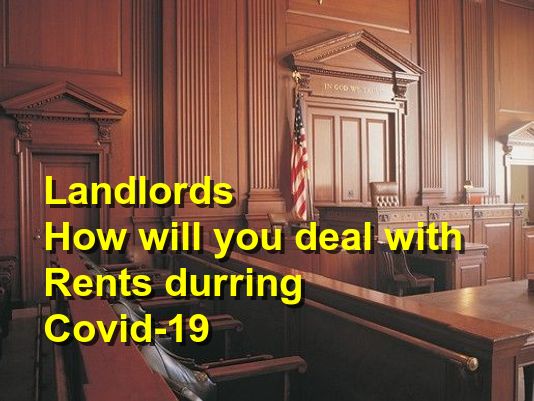Landlords who have been notified by their renters that rent will not be paid due to the coronavirus. What should they do?
They are asking us, how should we as rental housing providers respond to and handle these situations?
On March 16, 2020, The White House signed an Executive Order allowing local jurisdictions to enact eviction protections for renters that experience substantial financial hardships as a result of a tenant’s medical expenses, childcare, loss of wages, layoffs or reduction of hours relating to COVID-19 (Coronavirus). Following the order, cities have issued executive orders or have passed ordinances barring certain residential evictions.
So, what should you do if a renter tells you that he or she do not want to pay their rent?
Here are a few ways to approach this delicate and challenging issue:
 1. Communicate With Renters:
1. Communicate With Renters:
First, communicate with your renter. Empathize with them and let he or she know how you feel about these unprecedented circumstances. Explain that all of us are in the same situation and because you want to ensure you can continue to provide them with a safe, well-maintained home, that would be impossible without receiving the rent you depend on to maintain the building and to support your own family.
2. Offer Deferment Of Rent: read more below on – our five-point plan for dealing with late or missing rent.
Next, when necessary, consider offering a full or partial deferment of rent. But let your renter know any reduced or deferred rent is not forgiven rent, and that they will have to repay you.
3. Ask them to Provide Written Documentation:
Any renter that asks you to reduce or defer rent must provide you with written documentation that they have suffered adverse financial consequences due to the COVID-19 virus resulting in a “substantial” reduction or loss of income for any of the following reasons:
Sickness with COVID-19 or caring for a household or family member who is sick with COVID-19.
Lay-off, loss of hours, or other income reduction resulting from business closure or other economic or employer impacts of COVID-19.
Compliance with a recommendation from a government health authority to stay home, self-quarantine, or avoid congregating with others during the state of emergency.
Extraordinary out-of-pocket medical expenses.
Childcare needs arising from school closures related to COVID-19.
If you have been impacted by one of the situations above, your renter must provide you with written notice of his or her inability to pay the rent as soon as the circumstances set forth above arise. In addition, in order to temporarily avoid eviction proceedings, your renter is obligated provide specific, verifiable supporting financial, employment and/or medical documentation of loss of income and reflecting that his or her loss of income is directly attributable to COVID-19. After the expiration of the local emergency, the tenant must repay within the period of time set by local ordinance or government order. Be sure any rent reduction or agreement made with your renter is documented in writing through a lease amendment.
Remember, the law does not eliminate your renter’s obligation to pay the unpaid rent. After the expiration of the local emergency, your renter is obligated to repay any deferred or forgiven rent, and you as an owner may seek payment of the unpaid rent. if they dont? You may need our services for an eviction or an legal agreement?
Of course, if you’re not a landlord, you’re probably wondering, “What’s the big deal? Just do the nice thing and don’t make anyone pay rent.” But as Property Owners, Managers and Landlords we know that’s not necessarily possible, right?
I mean—unless the government changes something, we aren’t just going to be able to stop paying our mortgage payments, our taxes, the insurance, and everything it takes to keep our properties running. And despite what the general population thinks, most landlords are not rich, greedy, multinational corporations with billions sitting in the bank.
Most landlords are people just like you and me—people who, whether by accident or on purpose, ended up with a few rental properties and are trying to manage them while also working a job or running a business.
Most won’t be able to pay the bills on their properties long-term without receiving rent from our tenants.
How can we look at this situation and make decisions that are best for all. Well, I can’t answer for you necessarily, as we all have unique situations. But I can at least share with you my exact strategy that we have come up with.
Here’s our five-point plan for dealing with late or missing rent.
 Step 1: Have a Plan:
Step 1: Have a Plan:
Ok, this is kind of a summary point, but it needs to be made. Whether in the Wild West or dealing with a tenant, shooting from the hip is generally a pretty terrible plan. Making decisions on the fly usually results in bad decisions being made, so step one is commit to having a plan written down for how you will deal with this issue. Because for most property owners, this is not a question of IF but WHEN. Maybe this can become a plan that you follow, but even if you do something entirely different from what I’m about to say… just be sure you are prepared. This way, you won’t be shooting from the hip when that dreaded phone call comes in from the tenant who just lost their job.
Step 2: Empathize:
Now, the remainder of the steps here are more concrete, but I want to make sure we address this. Tenants are people, and they are going through a remarkably scary time, as well. Perhaps it’s even worse than you’re going through, because you’re probably more financially educated than many of your tenants.
So before anything else, listen to your tenant. Talk with them. Empathize with them. We’re all in this together, so let’s remember to be human and keep people before profit in our discussions.
Now that said, we still need rent. We can’t survive financially without it. So, that brings me to step three.
Step 3: Explain That Rent Is Still Due:
For as long as there have been tenants and landlords and bills to be paid, there is a super interesting piece of human behavior at play: People will pay the bills that give them the greatest consequence of not paying. In other words, most people financially struggling can pay most of their bills—but not always all of them.
This is why late fees are so vital in normal landlording. When the choice between paying rent and buying a flat-screen TV are presented to a tenant, the late fee and threat of eviction tips the scale toward using that money to pay rent.
But we’re not really dealing with flat-screen TVs today, are we? Regardless, the principle still applies. It’s likely your tenant is going to have to make some serious decisions on which bills are being paid. This is why after talking with the tenant and sympathizing with them, I believe it’s still important to let them know that the rent is still due.
As I’m sure you’ve heard, evictions are being suspended in most areas of the U.S. right now. The ability to issue a late fee might also be banned soon. Your tenant very well might assume that this means the need to pay rent is being suspended, and it’s your job to inform them otherwise.
Even if you can’t evict right now, it doesn’t mean they still don’t owe the rent, and it doesn’t mean you won’t evict when the courts open back up. You don’t need to be a jerk about it, but letting them know that you have a mortgage and other bills to pay is going to be important.
Step 4: Give Your Tenant Options:
Once you’ve explained that the rent is still due, now it’s time to help the tenant navigate this difficult time. We plan to do this by giving them their options, as they may be unaware of the different ways they could come up with the rent.
First, we plan to keep an eye on programs that the government is designing to help tenants. This is a rapidly changing time, so we’ll keep current on assistance programs. Right now, there is a very real possibility that the government is going to issue cash payments to every adult American, which could help. But even if they don’t, there may likely be local, state, or federal programs that could.
Also, we are going to offer other suggestions, as well. For example, could they borrow the money from a relative? Or could the rent be paid via credit card?
In fact, to help where we can, we plan to offer to pay the fee associated with using a credit card. Now would be a good time to get set up with a rent collection system that has the ability to get paid via credit card.
Step 5: Emergency Rent Deferral Plan:
Now, this is where I hope my tenants don’t watch this video—because I don’t want the tenant really knowing this is an option. If I brought this up at the beginning for tenants, most everyone would jump at it. Remember, humans will naturally pay the most pressing bill, so I need them to know that rent is incredibly high on their priority list.
So, step five is our “worst-case” measure that will only be mentioned to tenants when they don’t pay their rent—not when they call and say they won’t be able to. We will still let the tenant know that rent is due on the 1st, give them the options I just mentioned, and even still issue a late-notice to the tenant if they miss rent.
But what if they really have exhausted their options and just can’t pay the rent?
This is where we will introduce the tenant to our
Have a Rent Deferral Plan
_________________________________________________
And because you followed step one above, we have a specific plan in place to deal with this inevitable situation. Having this documented plan in place shows the tenant that this is not us winging it—but we have a system in place to handle it.
First, there is a really important question we will ask each tenant: “How much CAN you pay toward your rent?”
Chances are, even if they can’t pay all their rent, they can probably pay some of their rent. Maybe their rent is $1,000 per month, and they can only pay $300. We’ll accept that $300 and move onto the deferral plan.
Simply put, the ERDP allows the tenant to opt into a payment plan for their rent over the following 10 months. The deferral plan is an addendum to their lease that gives them the ability to take their rent and pay it in equal portions over the next 10 months (beginning the second month after enacting). It basically gives them an extra month before the increased payment begins.
For example, let’s say we’ve gone through all this, but the tenant simply cannot make the April 1st rent. They owe $1,000 in rent and because we asked what they can put toward it, they are able to pay $300. The remaining $700 becomes $70 per month and gets added to their rent beginning June 1st.
So, starting June 1st (not May 1st, and I’ll explain why in a second), they will pay $1,070 per month in rent until next March.
Why not start the payment next month? Simply because I have a strong suspicion that this is not going to end that quickly and a one-month deferral may not be enough time to get back on their feet. This is why we’re going to wait an extra month before adding the extra amount.
Furthermore, it is our company policy that during this time, a tenant will be allowed to use this twice. Of course, we won’t tell them this immediately, because we want to work through steps one through four first on the next month, as well. Rent has to remain a priority.
If after two months they are still unable to pay, the tenant may just need to be removed. This is completely uncharted territory we find ourselves in today, so I’m not going to lie to you and tell you I know exactly what we’ll do then. But the government can’t forever stop evictions and stop making people pay rent while continuing to force mortgage payments and foreclosures—or nearly every single landlord in the country will eventually go bankrupt.
If this social distancing, job loss, and potential economic meltdown continues, we’ll make new rules as it happens. My guess is that the government will offer more and more programs to attempt to help, because remember—you and I are not in this alone. Everyone is trying to figure this out.
And we will. Humans have an incredible ability to figure stuff out when the night is darkest. We will get through this. We will survive. We will emerge stronger.
I hope this sheds some light on what I’ll be doing in my personal rental portfolio to handle potential rent issues in the near future. Maybe you’ll be doing something different—and that’s great. I encourage you to share your thoughts below and let us know what your plan is. And perhaps together, we can help the world move forward financially.
NationalEvictions.com is here for you, We can prepare notices to be sent to Tenants, Have them Served to your Tenants, If and when the Notices expire have all the court forms ready to file with the courts for all Landlords
Find out more about your rights on our website: https://NationalEvictions.com
Tags:
Eviction Information,
LANDLORDS,
TENANTS


















